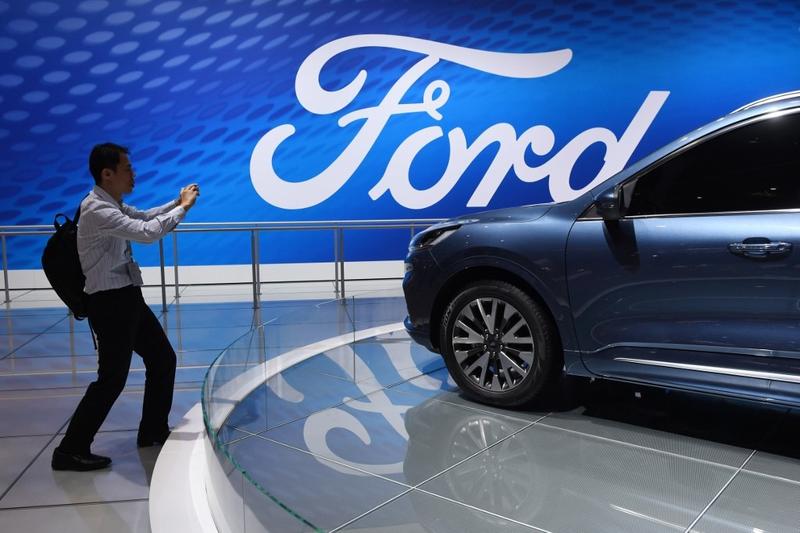Media Report

- The New York Times reports, "China's antitrust regulator on Wednesday announced a fine of around $25 million on Ford's main joint venture in the country, the latest action against an American company amid the widening economic battle between China and the United States. Changan Ford, which is owned equally by the Detroit automaker and a state-backed Chinese company, was fined as Washington and Beijing have taken aim at each other's businesses after the collapse of trade talks last month. First, the Trump administration barred American technology companies from selling to Huawei, the Chinese maker of smartphones and telecommunications equipment, denying it access to vital software, microchips and other components. Then, China said last week that it would create a blacklist of 'unreliable' foreign companies and people who harm the interests of Chinese firms, without giving specifics."
- Reuters reports, "Current and threatened U.S.-China tariffs could slash global economic output by 0.5% in 2020, the International Monetary Fund warned on Wednesday as world finance leaders prepare to meet in Japan this weekend. IMF Managing Director Christine Lagarde said in a blog and briefing note for G20 finance ministers and central bank governors that taxing all trade between the two countries, as President Donald Trump has threatened, would cause some $455 billion in gross domestic product to evaporate - a loss larger than G20 member South Africa's economy. 'These are self-inflicted wounds that must be avoided,' Lagarde said in an IMF blog post. 'How? By removing the recently implemented trade barriers and by avoiding further barriers in whatever form.' The IMF said that U.S. tariffs and Chinese retaliatory measures put in place thus far, including a recent increase in U.S. tariffs to 25 percent on a $200 billion list of Chinese imports, could cut 2020 growth by 0.3 percent."
- The Washington Post reports, "Chinese President Xi Jinping is talking up the Chinese economy's resilience as he heads to Moscow for a state visit affirming increasingly close ties between the former Cold War rivals. In interviews published Wednesday, Xi told Russian journalists Chinese consumer demand is driving growth despite the trade war with the United States. 'Looking into the future, a number of factors will support the steady, healthy and sustainable growth of China's economy, including abundant human resources, strong internal driving forces, growing development dynamism and mobilization capability,' Xi said. 'Therefore, China has all the necessary conditions, capability and confidence to deal with any risks and challenges,' he said without referring directly to the United States and the dispute with Washington over Chinese trade and technology policies.
Calendar
- 2019-06-04 A Slower Economy. A Trade War. Now, China Faces Rising Food Prices.
- 2019-06-03 China warns students about ‘risks’ of going to the U.S. in the latest twist to the trade war
- 2019-06-02 China Signals It Is Willing to Return to Trade Talks With US
- 2019-05-31 China says it will blacklist ‘unreliable’ companies and individuals in response to technology ban
- 2019-05-30 China Puts U.S. Soy Buying on Hold as Tariff War Escalates
- 2019-05-29 Huawei files motion to block U.S. ban, calling it an affront to global human rights
- 2019-05-28 The Trade War’s Next Front? China’s Access to Wall Street
- 2019-05-27 China Backs Yale Stance on Foreign Students, Rips US Actions
- 2019-05-26 China Warns Traders of 'Huge Loss' If They Short the Yuan
- 2019-05-24 China Commits to Trade Talks Amid ‘Groundless’ Huawei Suspicions
News
- The New York Times Ford Is Fined in China as Trade Fight With U.S. Rages
- Reuters IMF warns U.S.-China tariffs to slash global growth in 2020
- The Washington Post Amid trade war, China's Xi talks up economy, heads to Moscow
- NPR Huawei Chairman Willing To Sign A 'No-Spy' Deal With The United States
- The Washington Post Huawei Marine is being sold. That's unlikely to change the threat it poses.
- Bloomberg China's Churning Out Revolutionary Cancer Drugs Much Cheaper Than the U.S.
- CNBC Farmer sentiment hits its lowest level since before Trump's election as the China trade war drags on
- Bloomberg Tillerson Is Concerned China Will Give Up on Trade Talks
- Reuters China's Alibaba to invest $100 million in Russian e-commerce JV
- Bloomberg Trump Says Huawei 5G Debate Poses 'No Problem' to U.S.-U.K. Ties
- Reuters China launches rocket from ship at sea for first time
- Bloomberg China Approves First Three Companies for New Technology Board
- CNBC Tiffany says sales to Chinese tourists are plummeting because of the trade war
Commentary
- Bloomberg Boeing and China Still Need Each Other
- Financial Times China sows discord in the 'special relationship'
- The Wall Street Journal You Can't Trust a Chinese Audit
- The National Interest Why Taiwan Is America's Best Asset Against China
- The New York Times The U.S. and Chinese Presidents Should Go on a Weekend Retreat